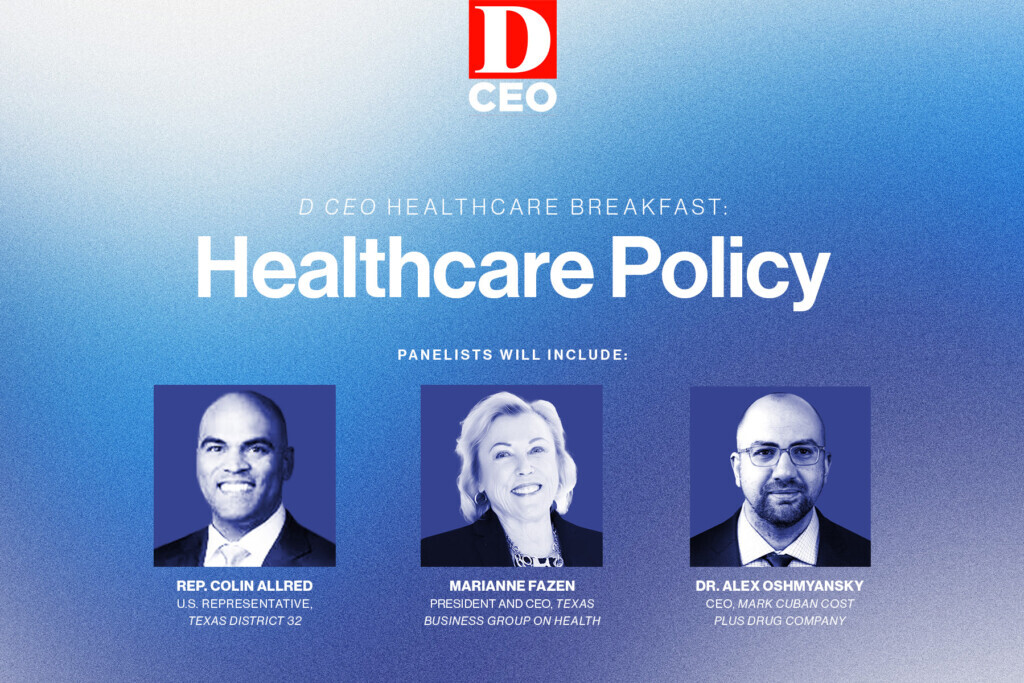Ahead of the November election, D CEO Healthcare hosted a panel discussing healthcare policy and its impact on cost and outcomes. The panel included a variety of perspectives from the pharmaceutical, employer, and legislative spaces. They discussedviable solutions to the problems, the inflation-reduction act, drug pricing, and the various perspectives of those affected by certain healthcare policies.
Panelists included U.S. Rep. Colin Allred, President and CEO of Texas Business Group on HealthMarianne Fazen, and Dr. Alex Oshmyansky, the president and CEO of Mark Cuban Cost Plus Drug Company.
Continue reading for a recap of the panel and some of the high points.
Rep. Allred on capping the spending for Medicare beneficiaries passed in the Inflation-Reduction Act:
“The overall goal was just to try and lower the costs for folks who were relying on Medicare. From personal experience, my mother is a retired public school teacher in the state, she’s on Medicare and she’s also a breast cancer survivor. So she has certain costs associated with her breast cancer treatment. So, capping these out of pocket costs for someone who’s on a fixed income–Medicare is really important, I know that just for my own personal life, and so it should help a lot of folks around the country with those areas.”
Dr. Oshmyansky’s efforts to reform the pharmaceutical industry via his company:
“Basically, we just cut the middleman out of the supply chain. Particularly these entities, the pharmaceutical wholesalers and the pharmacy benefit managers. In every industry, there’s kind of like middlemen that take a bit too much. It’s kind of cliché to say we cut out the middleman, but in pharma itself, specifically, like the amount that the middlemen take is crazy.”
Fazen on the effect of the inflation-reduction act on the workforce:
“Some of the other benefits in the inflation-reduction act would have had employers and their employees covered, but because it went through reconciliation, it was not passed by anyone in the republican party, all the things having to do with the commercially insured population were excluded. That’s one of the policies that is kind of the negative side for the employers. However, there’s a positive because of the controls the price controls that will be put on the drug prices. This will increase the transparency of the drugs, and it’s likely that the employees will have the benefit of that as well. In other words, the drug companies are probably not going to all of a sudden inflate all the prices for the commercially insured, when we can see quite easily exactly what they’re paying for with negotiating the pricing.”
Allred on the disconnect of bipartisan support within healthcare legislation:
“I know there are particular areas of agreement, but what we haven’t been able to see is a big bipartisan bill, which is necessary because reconciliation or the process of doing that, as I said earlier, is possible. Of course, we need to do legislation that goes outside of just controlling the budget; we still need to get past the filibuster, so we need 60 votes. It’s very unlikely that either party is going to have 60 votes and Senate and anytime in the near future.”
Fazen on the rise of employee costs:
“Employers are going to have to take the lead themselves, and they lead the charge by changing the way that they offer their healthcare to employees, because affordability is on top of their minds right now. Just to give you a few numbers that prospective employers are paying, this is an average for 2023, they’re paying an average cost of $13,800 per employee next year, at a six and a half percent increase in inflation, and for the employees it’s about a 9 percent increase. Inflation is clearly hitting everyone at every level of this community.”
Allred’ on how policy can promote better community engagement:
“In our city, in our area where folks cannot get access to fresh food and obviously we see the choices that families have to make; when that’s the case, we need to expand the child tax credit. So the child tax credit that we pushed in the American rescue plan provided most families with about 300 bucks a month per child and the North Texas Food Bank will tell you that they can watch and track the child tax credit hit bank accounts that their demand went down and demand came back up and when the child tax credit expired. The North Texas Food Bank of course provides folks with nutritious food, but it’s also just true that most families can’t afford healthy food and so as a policymaker, to my to your point, we are talking about the overall cost of health care, I absolutely agree with you that the largest driver,… but these are lifestyle related chronic diseases and that is largely driven by diet.”
Dr. Oshymyansky’s thoughts on transparency of healthcare prices:
“All of this financial engineering and complexity is just a way to artificially increase the prices. It won’t stop until this layer of financial engineering has been put upon the substrate U.S. healthcare is peeled away to reveal the actual pricing. Like imagine our same pricing model in hospitals, patients knew the cost of an ACL surgery plus 50 percent, or some reasonable amount Because a lot of the cost isn’t reaching the doctors, it’s not reaching the nurses, it’s reaching, administrative levels, which are adding this artificial complexity for its own sake.”





